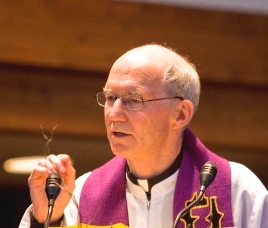Unfortunately many people today have stopped seeking the truth. They brush aside the big questions: What is the meaning of life? Why am I here? Does God exist? Who is Jesus?
When people talk about truth they look at it not as end in itself but as an instrument - a way to gain power or even a weapon.
Bishop Robert Barron points out that people today don't know how to have a good argument. They know how to shout, bully and call names. On how to have a good argument Bishop Barron gives the example of St. Thomas Aquinas. He begins by asking a question. Before stating his own position he gives the opposing arguments. Then he lays out the evidence and finally responds to his opponents' objections.
For example, he asks the most basic question: Doe God exist? He first gives the arguments against God's existence and makes sure he has correctly understood his opponents. Only then does state his own position and give the evidence for God's existence and he answers his opponents' objections. That's a good way of arguing, of seeking the truth.
Things are different today. The "new atheists" don't so much have new arguments but a particular method of arguing. They use shame - look at all the terrible things Christians have done! Instead of seeking truth they use a version of "truth" as a weapon.
This atmosphere causes many people to brush aside the question of truth. That's what Pilate does. After hearing Jesus say that he comes to testify to the truth, Pilate shows little curiosity. Instead he turns away. Is he afraid of the answer? Is he simply bored? Is he trying to avoid something that might upset his lifestyle?
Whatever his motive, when he brushes aside the issue of truth, he immediately falls into depravity. Pilate knows Jesus is innocent. He has committed no crime against Roman law. But the crowd shouts and Pilate gives in. He has Jesus whipped: a horrific punishment, a terrible injustice against an innocent man. Eventually he has Jesus killed in a vicious way. When a person treats truth lightly he becomes capable of gross injustice.
Pope Benedict points out that the dominant philosophy of Western society is relativism: the belief that there is no good or bad, no right or wrong, no true of false. It's just "my truth" and "your truth." This sounds tolerant but then the only way of deciding an issue is by who has the power, who can shout the loudest. The end result, says Pope Benedict, is the "dictatorship of relativism."
The question of truth is not simply intellectual. It's a spiritual problem. Jesus tells Pilate, "Everyone who belongs to the truth listens to my voice." I don't know about you but I want to belong to the truth. It doesn't mean I know everything or am always right. Far from it. As Pope Benedict points out, it's not that we possess the truth but that the truth possesses us.
Jesus says you will know the truth and the truth will make you free. People quote that line but forget the first part: You will become my disciples and you will know the truth - and the truth will make you free. Know Jesus who says, "I am the Way, the Truth and the Life."
Jesus wants us to speak the truth gently and with love. Our culture wants us to keep quiet. As Pastor Rick Warren notes: "Our culture has accepted two huge lies. The first is that if you disagree with someone’s lifestyle, you must fear or hate them. The second is that to love someone means you agree with everything they believe or do. Both are nonsense. You don’t have to compromise convictions to be compassionate."
To hold onto our convictions and to warn those falling into danger should not involve becoming harsh and judgmental. In his CD Who Am I to Judge? Dr. Edward Sri helps navigate between being judgmental and abdicating responsibility (like Pilate washing his hands). After praying and examining one's own conscience a person may say something gently and confidentially. And often it means to keep silent - as Jesus does when people judge him. I don't know about you, but I have enough to do dealing with my own mess-ups: Like we say in the penitential rite, what I have done and what I have failed to do.
In the new movie about St. Paul, the great apostle carries the burden of his past: his role in hunting down and killing innocent Christians. The film has a surprising resolution. I admit I was glad the theater stayed dark because I was bawling my eyes out. When the lights came on I saw others were worse off than me. As I went out I gave them a thumbs-up.
Taking our past to Jesus may hurt but ultimately brings joy. In a few minutes we will have the opportunity to venerate the cross. Whatever burden you are carrying take it to the cross. Jesus will transform it. Listen to his voice and and tell him you want to belong to the truth: to become his disciple, to know the truth - and the truth will make you free. Amen.

 RSS Feed
RSS Feed
